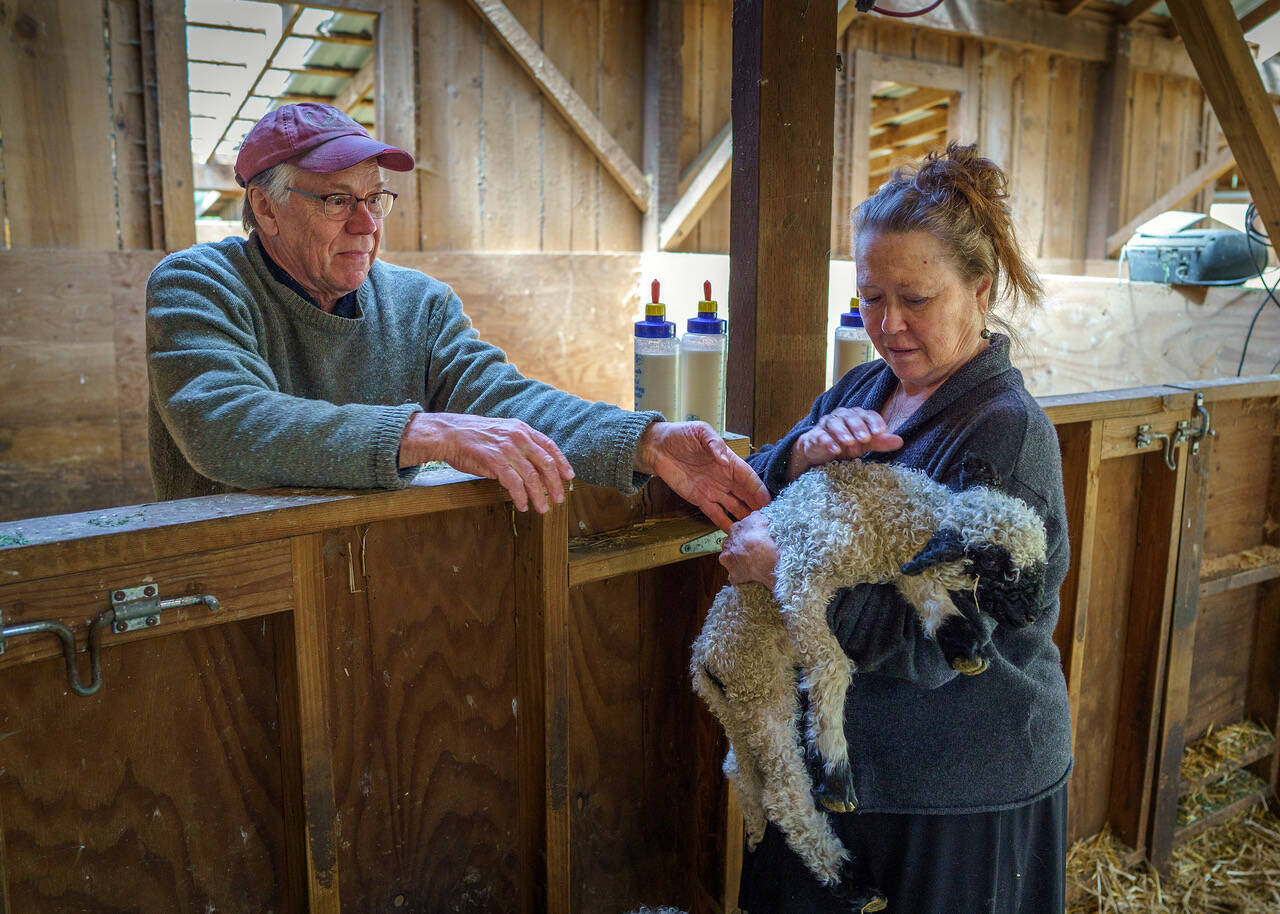On one of the first sunny days Whidbey Island saw during an unseasonably cold spring, a plethora of curly-haired lambs bleated and frolicked south of Oak Harbor.
Ranging from a few months to a few days old, they are the newest generation of a flock that is a genetic rarity in the U.S., and their home is Wild Rose Farm.
Nan and Ken Leaman, who own and operate Wild Rose Farm, are creating one of the first flocks of Wensleydale sheep in the U.S. through a process known as “up-breeding.”
Due to strict and longstanding laws about livestock importation, the Leamans and other sheep breeders like them cannot bring rams of these breeds from their native United Kingdom to North America. Instead, they artificially inseminated ewes with imported Wensleydale semen, producing lambs that were 50% Wensleydale.
The Leamans then repeated the process with the new sheep, and each subsequent generation, creating lambs that were genetically more and more similar to their purebred predecessors in Europe. The latest crop of lambs is 98% Wensleydale, Nan said, and they have been 15 years in the making.
Wensleydales, along with Teeswater sheep, which the Leamans have also been up-breeding at Wild Rose Farm, are known for their high-quality fleece. Both breeds are characterized by lustrous, shiny wool that hangs in long ringlets, making them ideal animals for the Leamans, who sell textile products.
Wild Rose Farm patrons can purchase wool at various stages of processing. The Leamans sell raw fleece; roving, which is fleece that has been washed and carded; yarn; and handwoven blankets and throws. They also sell breeding stock sheep and wethers that can give wool throughout their lives.
Sheep have always been a part of the Leamans’ story.
“They’re as much of a companion to humanity as any animal has ever been,” Ken said.
A longtime fiber artist, Nan has raised sheep for their wool for over 40 years. She met Ken early in his veterinary career when he visited her farm in 1979 to tend to a sick sheep.
They moved to the Stillaguamish Valley in the early 1980s, where Ken worked at a rural veterinary practice treating pets and farm animals. In 1992, they relocated to Whidbey Island, where Ken opened his own practice, the Penn Cove Veterinary Clinic.
They already had a small flock of sheep at the time, around 20 Lincoln and Romney sheep that they brought with them to the island. The Leamans, their four daughters and their small flock made their home on the bucolic property that is now known as Wild Rose Farm.
Nobody mows the lawn on the farm; the sheep do it themselves.
“We have a large property, and sheep were the perfect animal as far as grazing and keeping brush down,” Nan said.
Nan still practices fiber arts, though where she was once a spinner and a weaver, she is now a dyer and a felter. In addition to her felt work, some of which utilizes felt from the Wild Rose Farm flock, she also creates custom clothing items.
For Ken’s part, his veterinary skills are invaluable on the farm. He said he always enjoyed working with large animals such as those found on a farm.
“I love delivering babies,” he said. “I love the challenge of that and the beauty of it, and the miracle of it just doesn’t get old.”
Wild Rose Farm, he said, is something of a tribute to a bygone era in farming. Where small farms such as the Leamans’ used to be common all over the U.S., many have disappeared and given way to mass commercial farming. Here on Whidbey, however, Wild Rose Farm and others like it retain the “small agriculture aesthetic” that Ken said he has always found appealing.
Most recently, the Leamans have added a new breed of sheep to their flock — Valais Blacknose sheep, which are known for their cuteness. Though they cannot import Valais Blacknose rams or ewes into the country, the Leamans have imported embryos, which they have transferred to surrogate ewes, meaning the lambs born of these mothers are 100% Valais Blacknose.



